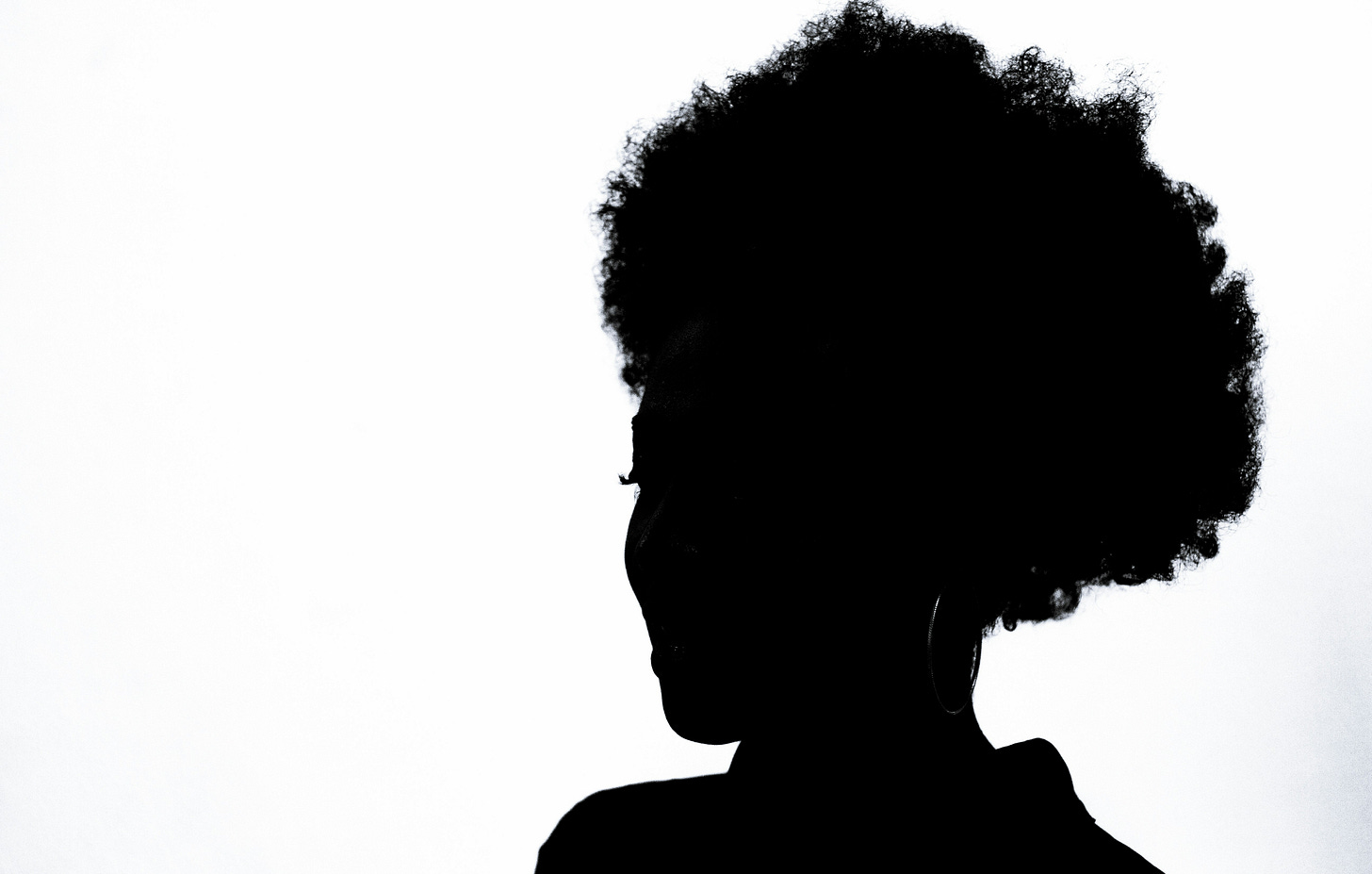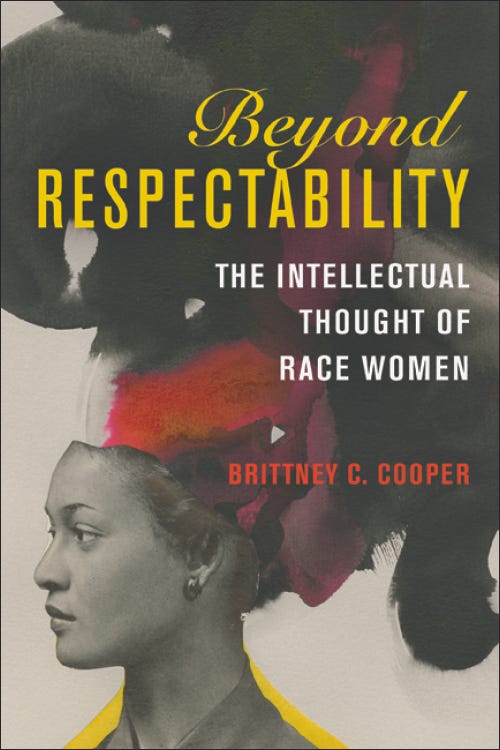Beyond Respectability
In an important book, Brittany C. Cooper asks us to reconsider the meaning and legacy of America’s Black female intellectuals.
We want, then, as toilers for the universal triumph of justice and human rights, to go to our homes from this Congress demanding an entrance not through a gateway for ourselves, our race, our sex, or our sect, but a grand highway for humanity.
―Anna Julia Cooper, A Voice from the South
Imagine, for a moment, that you had never heard of Thomas Jefferson, Benjamin Franklin, Thomas Paine, Ralph Waldo Emerson, or John Rawls—just some of the prominent men who shaped what the idea and reality of America are today. Imagine, furthermore, that these and other important thinkers on the origins, evolution, meaning, triumphs, and failures of the American experiment were hidden from you simply because someone decided white men were inferior in body and mind and thus incapable of serious intellectual endeavor. It is probably safe to say that such a situation is difficult, if not impossible, for most people to fathom. Yet that phenomenon is exactly what Brittany C. Cooper, the noted Black feminist scholar, describes in great and painful detail in her remarkable book, Beyond Respectability: The Intellectual Thought of Race Women.1
At the start of her book, Cooper presents the immense historical wrong she sets out to correct:
Many Black women thinkers labor under the exigencies of historical triage. Their names exist almost like family photos relegated to a wall we rarely touch. We know they are important. We memorialize them with honored places on the wall of our offices and libraries and in the histories we write. We celebrate their voluminous firsts as founders of organizations, published writers, recipients of advanced degrees, and more. But then we shelve them, as though preservation is the most apt way to show respect for their critical intellectual labor.2
Cooper’s central thesis is that most Americans are unaware of the contributions of Black female intellectuals in American history and that even many people who recognize their names do not engage with these women’s actual ideas. “What might it mean,” she asks poignantly in her prologue, “for Black feminist scholars to say they are theorists in the tradition of Anna Julia Cooper or Fannie Barrier Williams, or Ida B. Wells or Patricia Hill Collins or Joy James, in the same way that scholars are allowed to claim that they are Marxist, or Freudian, or Foucauldian, or Kantian, or Spinozan? What might it look like to be Cooperian or Wellsian in our approach to the study of Black women’s lives and Black intellectual thought?”3
To answer the question posed above, Cooper presents a wide-ranging, though never unfocused, survey of some of the finest Black female thinkers in American history. Through lucid and compelling prose, we learn about women such as Pauline Hopkins—journalist, novelist, and clubwoman—who first articulated the responsibility Black women had to examine every aspect of the question of race in America in order to mold and shape the new Black identity and community that was being created in the post-Civil War era.4 We learn about her contemporary Lucy Craft Laney, founder of the Haines Institute in Augusta, GA, who argued for Black women to assume a position of “respectability,” in direct opposition to the traditional racist trope that Black women represented an unbridled sexuality and sensuality that were threatening to white society. We read also about the National Association of Colored Women, founded in 1896, which “served as the training ground for the first generation of Black women public intellectuals.”5
To her credit, Cooper goes beyond biography and provides us a preliminary understanding of the innovative theories, ideas, frameworks, and debates that defined the intellectual lives of these Black female thinkers. Perhaps no figure in the book better encapsulates the depth, reach, and intellectual might of the women portrayed than Anna Julia Cooper. Foreshadowing Kimberlé Crenshaw’s contemporary work on intersectionality, Anna J. Cooper wrote about her experience searching for a rest room in a train station. “When she found the bathroom,” the author notes, “one door was marked ‘for ladies’ and the other ‘for colored people.’ This created a moment of cognitive and experiential dissonance for Cooper, who was left ‘wondering under which head I come.’”6 The author notes that “Cooper’s colored and female body ontologically challenged the epistemological claims that those signs made.” In other words, “Cooper’s textually present Black female body demanded to be known, in the very ways the signs attempted to foreclose.”7
Anna Julia Cooper and her intellectual peers and descendants, notes the author, “took it as their political and intellectual work to give shape and meaning to the Black body in social and political terms, to make it legible as an entity with infinite value and social worth.”8 The tragedy Brittany Cooper documents is how the contributions of these race women were marginalized and often forgotten not just by white intellectuals but by Black male leaders as well:
Although Black women have professed and proclaimed intricate, compelling, and important ideas about the state of Black people in the public—since Phillis Wheatley began writing poetry—when the term Black public intellectual is used, only a limited number of people come immediately to mind. In the nineteenth and twentieth centuries, there is Frederick Douglass (but not his mentees, Mary Church Terrell and Ida B. Wells); Booker T. Washington (but not his wife, Margaret Murray Washington); W. E. B. Du Bois (but not his contemporaries, Anna Julia Cooper or Fannie Barrier Williams); E. Franklin Frazier, Martin Luther King (but not their contemporaries, Anna Arnold Hedgeman and Pauli Murray); and Harold Cruse (but not his contemporary, Toni Cade Bambara). The history of Black public intellectualism is a history of race men” [emphasis mine].9
Reflecting on the ideas of women such as Fannie Barrier Williams and Mary Church Terrell, I am struck by how much has been lost through the neglect of the intellectual output of the women Cooper documents. Take, for example, the conception of racial identity which, Fannie Barrier Williams argued, “was not ‘natural’ but rather contingent, and conceived through an active process of community organizing and knowledge-making.”10 Her thesis had both prescriptive and restrictive implications. It was prescriptive (and prescient) in its argument that Black Americans needed to define their own racial identity through communal and social processes and institutions. It was restrictive in reminding all Americans that the word race— as it was, and is, understood in America—is itself a mental construct that has no basis in science, biology, or even history. Indeed, there is no recorded example of our conception of racism in antiquity. Prejudice based on habits, language, or nationality did exist but not discrimination simply on the basis of skin color. As the African-American classicist Frank Snowden has noted:
The ancients did not fall into the error of biological racism; black skin color was not a sign of inferiority. Greeks and Romans did not establish color as an obstacle to integration in society. An ancient society was one that for all its faults and failures never made color the basis for judging a man.11
The division of humanity into “races” was a vile, and permanently fragile, ideology invented to justify imperialist subjugation of one part of the world for the benefit of another.
Having examined the intellectual foundations laid down by key race women in the late 1800s and early 1900s, the author describes the intellectual connections between these women and their 20th century literary heirs—women such as Toni Cade Bambara, Toni Morrison, and Alice Walker. In doing so, Cooper lays out a challenge to the scholars who would follow in her footsteps:
It is my generation’s job not only to make sure those markers remain meticulously landscaped and in full view but also to dig deeper, to think seriously about the material conditions and intellectual terms upon which our thinkers are memorialized, and to retrieve and revisit their work with renewed vigor and scrutiny.12
Cooper highlights the urgency of her challenge when she notes that “if pressed to name the most prominent Black thinkers of our day, the list looks remarkably like it did nearly twenty-five years ago,” adding that the names would be those of men like Cornel West, Henry Louis Gates, Michael Eric Dyson, Marc Lamont Hill, and Robin D. G. Kelley.13 “By (re)turning to the figure of the race woman,” Cooper concludes, “Beyond Respectability interrogates the persisting cultural and gender narratives that continue to circumscribe Black women’s leadership possibilities within African American communities and the broader public sphere.”14
It would be easy simply to lament the history Cooper describes as another sad legacy of America’s racist past, yet such a conclusion would ignore the contributions that the ideas of these women can make to contemporary intellectual and social discourses. The writings and speeches of Anna Julia Cooper, Mary Church Terrel, Pauli Murray, and their heirs should matter not just to the intellectual historian but to all students of American philosophy, rhetoric, history, and literature. Their ideas should be considered and debated because they are archetypes of Black feminine intellectual labor and, perhaps even more importantly, because they are instructive and important in their own right. Relegating the subjects of Cooper’s book to mere biographical milestones misses their vibrant minds, their deep and thoughtful consideration of the nature of this nation, and the insightful, often sparkling, ways in which they made meaning from their physical selves and the world around them—a world usually hostile to their claims of intellectual legitimacy. Beyond Respectability is a fine first step in the correction of an historical injustice. It is also a window into a world of ideas that has remained unexamined and unappreciated for far too long.
A race woman is “a black woman, esp. one who (strongly) advocates the rights of black people; cf, race man,” Oxford English Dictionary online, accessed on May 8, 2024, https://www.oed.com/dictionary/race-woman_n?tl=true.
Brittany Cooper, Beyond Respectability: The Intellectual Thought of Race Women (Urbana: University of Illinois Press, 2017), 2.
Cooper, Beyond Respectability, 3.
Cooper, Beyond Respectability, 12.
Cooper, Beyond Respectability, 17.
Cooper, Beyond Respectability, 7.
Cooper, Beyond Respectability, 8.
Cooper, Beyond Respectability, 21.
Cooper, Beyond Respectability, 24.
Cooper, Beyond Respectability, 52.
Frank Snowden, National Humanities Medal award text, 2003, https://www.neh.gov/about/awards/national-humanities-medals/frank-m-snowden-jr#:~:text=%22The%20ancients%20did%20not%20fall,basis%20for%20judging%20a%20man.%22. See also, Frank Snowden’s Blacks in Antiquity (Cambridge: Belknap Press, 1970).
Cooper, Beyond Respectability, 139.
Cooper, Beyond Respectability, 145.
Cooper, Beyond Respectability, 148.





